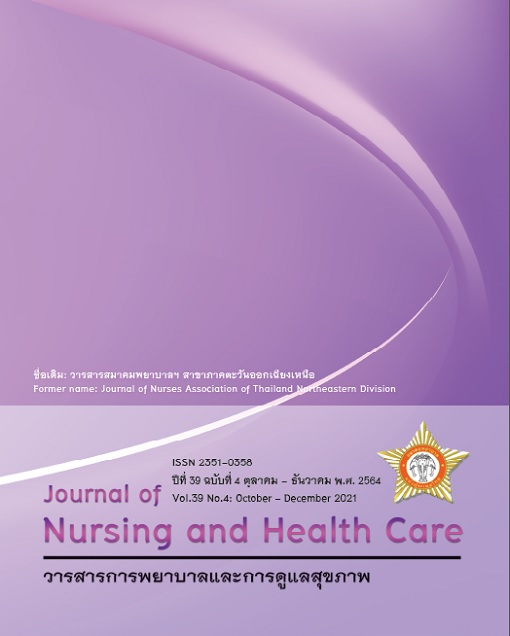ผลของโปรแกรมส่งเสริมสุขภาพจิตด้วยการให้สุขภาพจิตศึกษาแบบกลุ่มร่วมกับรูปแบบความสุขเชิงจิตวิทยา 5 มิติ ต่อคุณภาพชีวิตและความสุขของผู้สูงอายุ
คำสำคัญ:
: ความสุข โปรแกรมส่งเสริมสุขภาพจิต การให้สุขภาพจิตศึกษาแบบกลุ่ม ผู้สูงอายุบทคัดย่อ
การวิจัยนี้เป็นวิจัยกึ่งทดลองแบบกลุ่มเดียววัดก่อนและหลังการทดลอง มีวัตถุประสงค์เพื่อศึกษาผลของโปรแกรมส่งเสริมสุขภาพจิตด้วยการให้สุขภาพจิตศึกษาแบบกลุ่มร่วมกับรูปแบบความสุขเชิงจิตวิทยา 5 มิติ ของผู้สูงอายุ กลุ่มตัวอย่างเป็นผู้สูงอายุกลุ่มติดสังคม ในเขตเทศบาลเมืองชุมเห็ด จังหวัดบุรีรัมย์ จำนวน 30 คน คัดเลือกแบบเฉพาะเจาะจงตามคุณสมบัติที่กำหนดไว้ เครื่องมือวิจัยประกอบด้วยโปรแกรมส่งเสริมสุขภาพจิตด้วยการให้สุขภาพจิตศึกษาแบบกลุ่มร่วมกับรูปแบบความสุขเชิงจิตวิทยา 5 มิติ ที่ผู้วิจัยสร้างขึ้นเองผ่านการตรวจสอบจากผู้เชี่ยวชาญ ได้ดัชนีความตรงเชิงเนื้อหาเท่ากับ 0.92 เก็บข้อมูลโดยแบบวัดความสุข และแบบวัดคุณภาพชีวิตของผู้สูงอายุ มีค่าความเที่ยงสัมประสิทธ์แอลฟาครอนบาคเท่ากับ 0.84 และ 0.88 ตามลำดับ วิเคราะห์ข้อมูลโดยสถิติบรรยายแจกแจงความถี่ ร้อยละ ค่าเฉลี่ย ส่วนเบี่ยงเบนมาตรฐาน และสถิติทดสอบที
ผลการวิจัย พบว่า คะแนนเฉลี่ยคุณภาพชีวิตและคะแนนเฉลี่ยความสุขโดยรวมภายหลังเข้าร่วมโปรแกรมส่งเสริมสุขภาพจิตด้วยการให้สุขภาพจิตศึกษาแบบกลุ่มร่วมกับรูปแบบความสุขเชิงจิตวิทยา 5 มิติสูงขึ้นอย่างมีนัยสำคัญทางสถิติที่ระดับ .05 ผลการวิจัยนี้แสดงให้เห็นว่าโปรแกรมส่งเสริมสุขภาพจิตด้วยการให้สุขภาพจิตศึกษาแบบกลุ่มร่วมกับรูปแบบความสุขเชิงจิตวิทยา 5 มิติสามารถนำไปใช้เป็นแนวทางเพื่อจัดกิจกรรมเพื่อส่งเสริมสุขภาพจิตในผู้สูงอายุได้อย่างเหมาะสม
Downloads
เอกสารอ้างอิง
2. World Health Organisation. The mental health of older adults[Databsed on the Internet]. 2018 [cited 2018 December 20 ]. Availiable from http://www.who.int/news- room/fact-sheets/detail/mental-health-of-older-adults .
3. Statistical Office of Thailand. Report on the 2017 survey of the older persons in Thailand [Databsed on the Internet]. [cited 2018 December 20]. Availiable from http://www.nso.go.th/sites/2014en/Survey/ social/domographic/OlderPersons/2017/Full%20 Report_080618.pdf
4. National Statistical Office Office of the Prime Minister. Thailand's key statistical data collection [Databsed on the Internet].2020 [cited 2017 December 20 ]. Availiable from Source : http : //www.nso.go.th.
5. Williams L, Zhang R, Packard K.C. Factors affecting the physical and mental health of older adults in China: the importance of marital status, child proximity, and gender. SSM Popul Health 2017; 3: 20–36.
6. Collin, A.L., Goldman, N, and Rodriguez, G. Is positive well-being protective of mobility limitation among older abults?, J. Gerontol. Psychol. Sci. 2008, 63 : 321-327.
7. Chuanwan S. The situation in Aging living alone. The situation in Aging Report.Bangkok.2018.
8. Lazarus R.S, Folkman S. The Concept of coping, In Monat, A. and Lazarus R.S. (Eds.). Stress and Coping an Anthology, 3rd Ed., Columbia University Press, New York ; 1991.
9. Elliott S, Painter J, Hudson S. Living alone and fall risk factors in community-dwelling middle age and older adults. Journal of Community Health 2019; 34:301–310.
10. Mongkol A, Yongyut Y, Tangseree T, Hatpana W, RomSai P, Jutha W. (2009). Development and testing of Thai mental health indicators . The community printing press; 2007.
11. Tae WL, Sun K, Kyung JL. (2006).Health promotion behaviors and quality of life among community- dwelling elderly in Korea: A cross-sectional survey. Int J Nurs Stud 2006; 43(3): 293-300
12. Panyasa K. The effectiveness of health promotion programs for improving quality of life based on the needs of the elderly. Journal of Public Health, Burapha University2017; 12 (2): 65-74.
13. Department of Health, Ministry of Public Health. Components of Long Term Care Subdistrict Operations for Elderly Health (Long Term Care). Khon Kaen: Health Center 6 Khon Kaen; 2014.
14. Chutidej Cheandon. Quality of life of the elderly in rural areas. Wang Nam Khiao District, Nakhon Ratchasima Province. Journal of Public Health 2011; 41(3) : 229-239.
15. Tangpian P. Social Support Self-esteem and quality of life of Elderly people in the elderly club Phranangklao Hospital Nonthaburi Province. Thesis, Master of Science. Bangkok: Kasetsart University; 2008.
16. Laohabut P. Quality of life of the elderly in the community in Moo 7, Plutaluang Sub-district, Sattahip District, Chonburi Province. Thesis of the Master's Degree Program (General Administration). Chonburi: Burapha University; 2014.
17. Anderson C. et al. A comparative study of the impact of education vs process groups for families of patients with affective disorders. Family Process 1990; 25: 185–205
18. Department of Mental Health. (2012). Handbook of 5 dimensions of happiness for the elderly. Bangkok Beyond Publishing; 2012.
19. Sapthanawin P. Quality of life of the elderly living in Ramintra Housing Community, Bang Khen District, Bangkok. Master of Arts thesis Graduate School. Bangkok: Kasetsart University; 2012.
20. Gray R et al. A new perspective on the definition of the elderly: a social psychology and health perspective. Nakhon Pathom: Institute for Population and Social Research. Mahidol University; 2013.
21. Mongkol A et al. Research Report on Development and Testing of Thai Mental Health Index (Version 2007): Department of Mental Health, Ministry of Public Health. Bangkok: Agricultural Cooperatives Association of Thailand ; 2009.
22. Betty R. Kirkwood. Essentials of Medical Statistics. 25 John Street, London WCIN 2BL 23 Ainslie Place, Edinburgh EH3 6AJ: Blackwell Science Ltd; 1988.
23. Gabriel Z, Bowling A. Quality of life from the perspectives of older people. Ageing & Society2004; 24 : 675-691.
24. George L.K. Still happy after all these years: Research frontiers on subjective well-being in later life, J. Gerontol. Soc. Sci, 2010; 65 : 229-331.
25. Rana A.K. M.M, Wahlin A, Lundborg C.S, Kabir Z.N. Impact of health education on health-related quality of life among elderly persons: results from a community-based intervention study in rural Bangladesh. Health Promotion International 2009; 24(1): 36-45.



